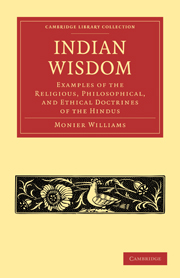Book contents
- Frontmatter
- PREFACE
- THE INDO-ROMANIC ALPHABET WITH THE EQUIVALENT SANSKṚIT LETTERS AND RULES FOR PRONUNCIATION
- Contents
- INTRODUCTION
- LECTURE I The Hymns of the Veda
- LECTURE II The Brāhmana Portion of the Veda
- LECTURE III The Systems of Philosophy
- LECTURE IV The Nyāya System of Philosophy
- LECTURE V The Sānkhya System of Philosophy
- LECTURE VI The Mimāṉsā System of Philosophy
- LECTURE VII Irregular Systems and Eclectic School
- LECTURE VIII Smṛiti. The Vedāngas
- LECTURE IX Smārta-sūtra. Gṛihya, ‘domestic rules’
- LECTURE X The Law-books. Mainu continued
- LECTURE XI Metrical Version of some of Manu's Moral and Religious Precepts
- LECTURE XII The Epic Poems
- LECTURE XIII The Mahā-bhārata
- LECTURE XIV The Epic Poems compared together and with Homer
- LECTURE XV The Artificial Poems
- INDEX
- ADDITIONS AND CORRECTIONS
- ORIENTAL WORKS
INTRODUCTION
Published online by Cambridge University Press: 29 August 2010
- Frontmatter
- PREFACE
- THE INDO-ROMANIC ALPHABET WITH THE EQUIVALENT SANSKṚIT LETTERS AND RULES FOR PRONUNCIATION
- Contents
- INTRODUCTION
- LECTURE I The Hymns of the Veda
- LECTURE II The Brāhmana Portion of the Veda
- LECTURE III The Systems of Philosophy
- LECTURE IV The Nyāya System of Philosophy
- LECTURE V The Sānkhya System of Philosophy
- LECTURE VI The Mimāṉsā System of Philosophy
- LECTURE VII Irregular Systems and Eclectic School
- LECTURE VIII Smṛiti. The Vedāngas
- LECTURE IX Smārta-sūtra. Gṛihya, ‘domestic rules’
- LECTURE X The Law-books. Mainu continued
- LECTURE XI Metrical Version of some of Manu's Moral and Religious Precepts
- LECTURE XII The Epic Poems
- LECTURE XIII The Mahā-bhārata
- LECTURE XIV The Epic Poems compared together and with Homer
- LECTURE XV The Artificial Poems
- INDEX
- ADDITIONS AND CORRECTIONS
- ORIENTAL WORKS
Summary
IN this Introduction I shall endeavour, first, to explain how Sanskṛit literature is the only key to a correct knowledge of the opinions and practices of the Hindū people; and, secondly, to show how our possession of India involves special responsibilities and opportunities with reference to the study of the three great systems of belief now confronting Christianity in the world—Brāhmanism, Buddhism, and Islām.
To clear the ground let me review very briefly the past and present history of the great country whose teeming population has been gradually, during the past two hundred and fifty years, either drawn under our sway, or, almost against our will, forced upon our protection.
The name India is derived from the Greek and Roman adaptation of the word Hindū, which was used by the Persians for their Āryan brethren, because the latter settled in the districts surrounding the streams of the Sindhu (pronounced by them Hindhu and now called Indus). The Greeks, who probably gained their first conceptions of India from the Persians, changed the hard aspirate into a soft, and named the Hindūs ’Ινδοí (Herodotus IV. 44, V. 3). After the Hindū Āryans had spread themselves over the plains of the Ganges, the Persians called the whole of the region between the Panjāb and Benares Hindūstān or ‘abode of the Hindūs,’ and this name is used in India at the present day, especially by the Musalmān population. The classical name for India, however, as commonly employed in Sanskṛit literature and recognized by the whole Sanskṛitic race, more particularly in Bengal and the Dekhan, is Bhārata or Bhārata-varsha—that is to say—‘the country of king Bharata,’ who must have ruled over a large extent of territory in ancient times (see pp. 371, 419 of this volume).
- Type
- Chapter
- Information
- Indian WisdomExamples of the Religious, Philosophical, and Ethical Doctrines of the Hindus, pp. xv - xlviiiPublisher: Cambridge University PressPrint publication year: 2010

